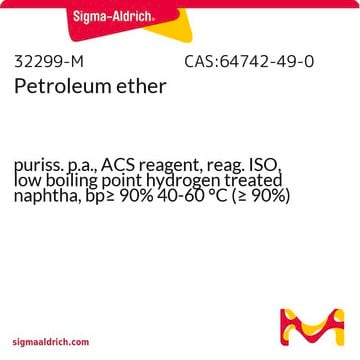34862-M
2,2,4-Triméthylpentane
suitable for HPLC, ≥99%
Synonyme(s) :
Isooctane
About This Item
Produits recommandés
Densité de vapeur
3.9 (vs air)
Pression de vapeur
41 mmHg ( 21 °C)
Essai
≥99%
Forme
liquid
Température d'inflammation spontanée
745 °F
Limite d'explosivité
6 %
Technique(s)
HPLC: suitable
Impuretés
≤0.0005% non-volatile matter
≤0.001% free acid (as CH3COOH)
≤0.01% water (Karl Fischer)
Transmittance
210 nm, ≥20%
235 nm, ≥80%
270 nm, ≥98%
Indice de réfraction
n20/D 1.391 (lit.)
pb
98-99 °C (lit.)
Pf
−107 °C (lit.)
Densité
0.692 g/mL at 25 °C (lit.)
Chaîne SMILES
CC(C)CC(C)(C)C
InChI
1S/C8H18/c1-7(2)6-8(3,4)5/h7H,6H2,1-5H3
Clé InChI
NHTMVDHEPJAVLT-UHFFFAOYSA-N
Vous recherchez des produits similaires ? Visite Guide de comparaison des produits
Catégories apparentées
Description générale
Application
Mention d'avertissement
Danger
Mentions de danger
Conseils de prudence
Classification des risques
Aquatic Acute 1 - Aquatic Chronic 1 - Asp. Tox. 1 - Flam. Liq. 2 - Skin Irrit. 2 - STOT SE 3
Organes cibles
Central nervous system
Code de la classe de stockage
3 - Flammable liquids
Classe de danger pour l'eau (WGK)
WGK 2
Point d'éclair (°F)
10.4 °F - closed cup
Point d'éclair (°C)
-12.00 °C - closed cup
Faites votre choix parmi les versions les plus récentes :
Déjà en possession de ce produit ?
Retrouvez la documentation relative aux produits que vous avez récemment achetés dans la Bibliothèque de documents.
Notre équipe de scientifiques dispose d'une expérience dans tous les secteurs de la recherche, notamment en sciences de la vie, science des matériaux, synthèse chimique, chromatographie, analyse et dans de nombreux autres domaines..
Contacter notre Service technique







